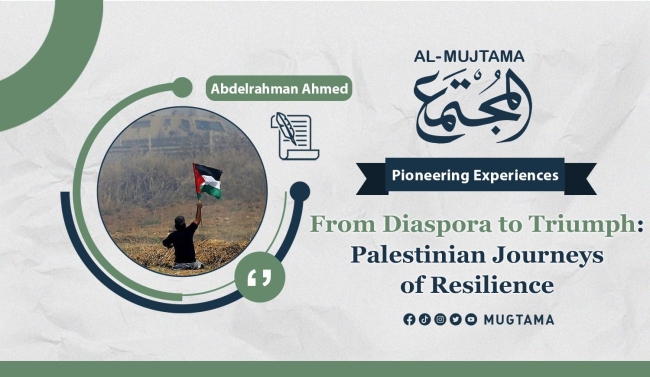According to the latest figures provided by the Palestinian Central Bureau of Statistics, approximately 7.3 million Palestinians live in the diaspora, spanning from some Arab countries, across Europe, to America and Australia. The majority of them dream of returning to their homeland, while the Israeli occupation continues to seize land for the establishment of more settlements, isolating over 2.2 million Palestinians in the Gaza Strip.
Many of those living in the diaspora have achieved significant accomplishments in various fields, armed with knowledge and experience that enabled them to withstand dangers, overcome challenges, and excel at every step. In each endeavor, the Palestinian cause remained present in their minds, providing remarkable examples of instilling hope in the hearts of Palestinian diaspora, emphasizing that opportunities are abundant, and nothing is impossible. They stand as exemplars of resilience and determination despite the bitterness of forced displacement and confinement.
Take, for example, the brilliant Palestinian engineer from Gaza, Hatem Safadi, who has achieved leadership in the field of architectural engineering in Germany. Despite the challenging life in resilient Gaza, he excelled and obtained a degree in architectural engineering from the Technical University of Berlin in 1997. Subsequently, he created artistic masterpieces known for their luxury and high taste, gaining international fame and receiving numerous international certificates and awards. One of his notable projects includes the restoration of artifacts dating back to the Prussian Kingdom era between the 18th and 20th centuries.
The success story of Dr. Thabet Al-Khatib, a specialist in applied neuroscience, serves as a distinguished example of Palestinian minds succeeding remarkably in the West. She works as a researcher in the Department of Applied Neuroscience at the School of Medicine, University of Aberdeen, Britain, one of the oldest and most renowned universities. Dr. Al-Khatib has made remarkable progress in the global medical community and succeeded in inventing a treatment for Alzheimer's disease after spending countless hours in laboratories. Today, she travels the world, presenting her research and ideas at international conferences, proving the brilliance of the Palestinian personality that believes in itself and its capabilities, refusing to surrender regardless of the difficulties faced.
Similarly, the story of the late Dr. Ali Na'ifeh, known as the "Arab Einstein," serves as a clear example of the perseverance, ambition, and determination embodied by the Palestinian character. Growing up in challenging family conditions, he completed his education, worked as a teacher in Palestinian and Jordanian schools, pursued higher education in the United States, specializing in mechanical engineering, and became one of the world-renowned engineers who left a significant mark in their fields. Dr. Na'ifeh registered numerous patents that had a broad impact in various life domains.
Na'ifeh did not deprive his Arab homeland of his knowledge and experiences; he founded Yarmouk University in Jordan, volunteered to work there, established the College of Engineering at King Abdulaziz University in Jeddah, and developed mechanical engineering programs in various Islamic and Arab universities. He also developed a device for instant detection of certain types of bacteria in liquids and air, contributing to the elimination of laboratory tests. This device proved beneficial for millions of patients in countries where "Ebola" bacteria were prevalent, earning him the prestigious Benjamin Franklin Award, the highest international award in the field of mechanical engineering.
Among the Palestinian scientists who excelled in the diaspora is Adnan Majli, who founded a company in the United States, successfully providing treatments for challenging diseases, in addition to innovative treatments for diabetes and Alzheimer's.
Here is Dr. Nadia Al-Haj Yasin, a scientist in the field of molecular nutrition at one of Norway's largest universities. And Dr. Mona Al-Dzdar, the first Palestinian-origin minister in the government of Austria, succeeded in shedding light on the Palestinian cause as well as displacement issues in general.
In the field of finance and business, there are shining Palestinian names who have achieved remarkable success. One of the prominent figures is the businessman Talal Abu Ghazaleh, the founder and president of the Talal Abu Ghazaleh International Group, specializing in accounting, financial, administrative services, information technology, and intellectual property. Despite his wealth and prestigious international position, he never allowed his business activities to distract him from his cause - the Palestinian cause. Whenever given the opportunity in media appearances, he condemns the Israeli occupation and emphasizes the inevitability of the disappearance of Israel. Regardless of agreement or disagreement with the man, he has many positions that support his people and strengthen their resilience on their land.
There is also the Palestinian businessman Nael Touqan, who owns one of the largest advertising companies not only in Sweden but also in Northern Europe. His company collaborates with major global corporations, and personally, he serves as the chief Arabic translator at the Swedish Migration Board. He has created an Arabic-Swedish dictionary titled "The Rosy Masterpiece in the Swedish Language," expressing his love for the Arabic language and pride in his identity.
The success stories of Palestinians in the diaspora are numerous and cannot be confined to economic, scientific, medical, or sports fields alone. When we talk about success stories, we do not mean success that only reflects on the individual, but rather success that extends to their homeland and their core cause. Upon reflection and research, it becomes evident that there are vast numbers of those who were displaced from Palestine due to occupation, and their pursuits and paths were not diverted from their struggle for the rights of the Palestinian people, presenting their cause before the conscience of the world.


